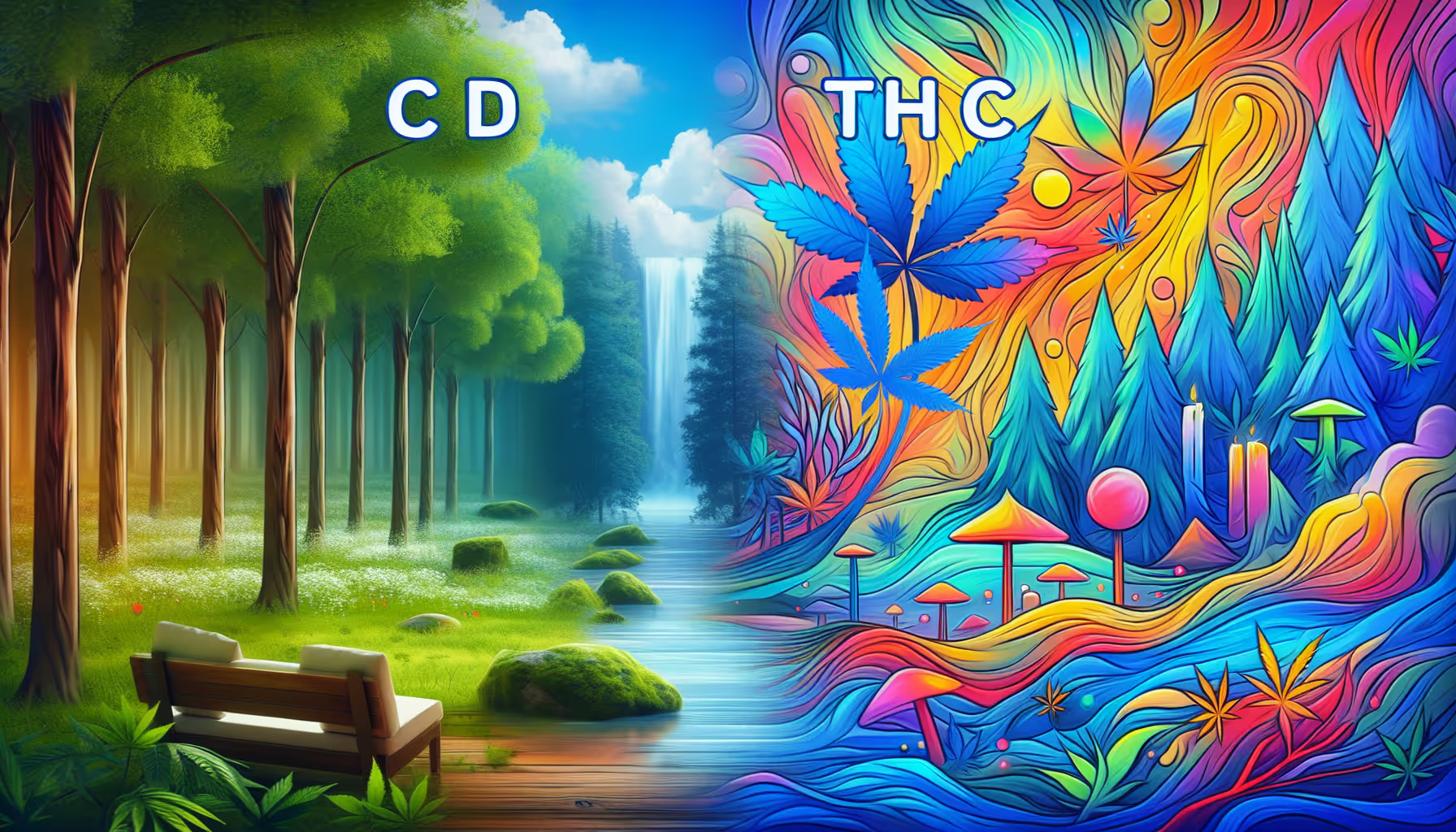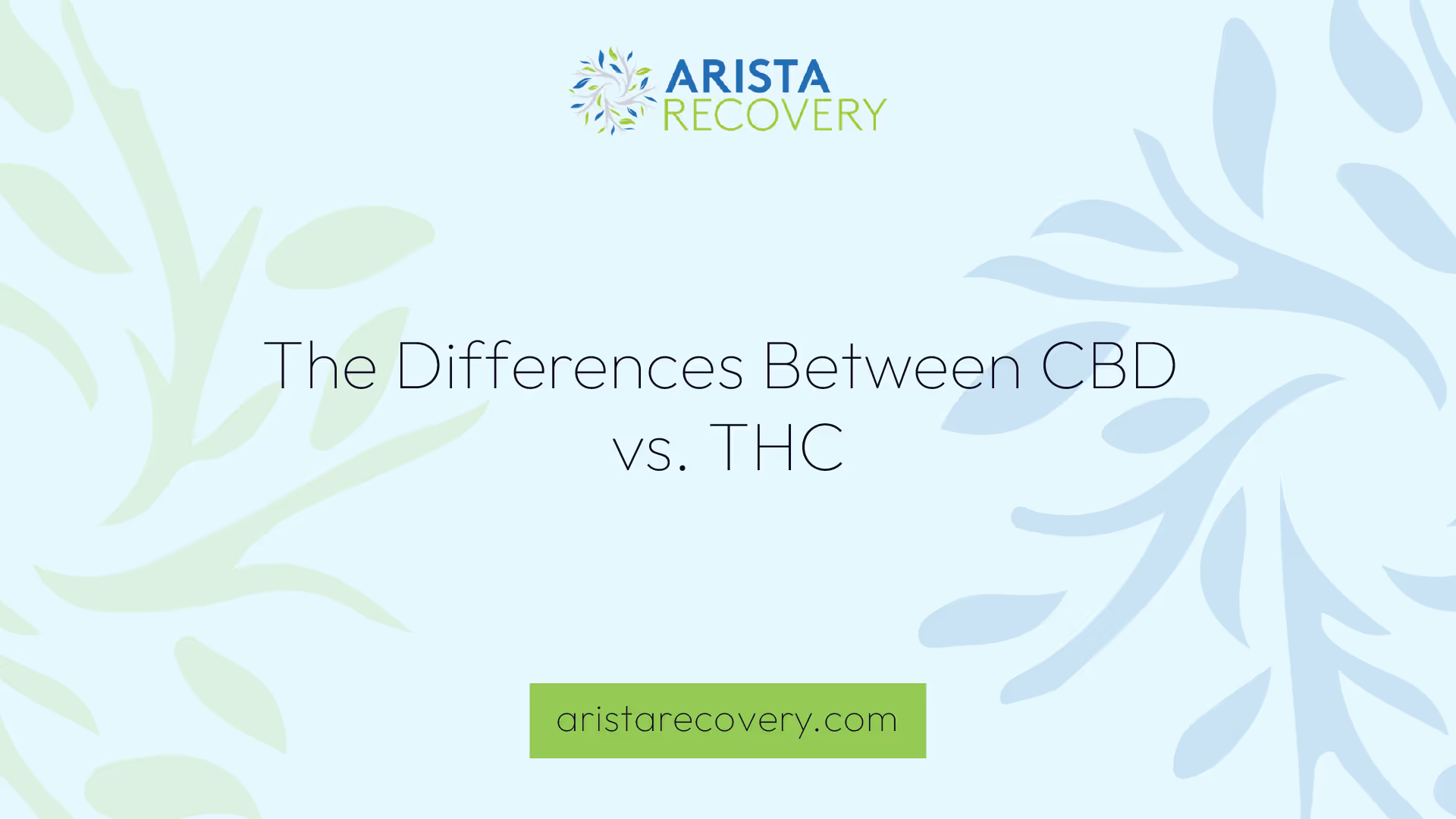
The Differences Between CBD vs. THC
Understanding CBD and THC
Before delving into the difference between CBD vs THC, it’s important to understand what these compounds are and their individual properties.

What is CBD?
CBD, or cannabidiol, is a compound found in the cannabis plant. Unlike THC, CBD lacks the psychoactive effects associated with the characteristic high of cannabis. In other words, it does not produce the high associated with cannabis use. CBD and THC have the same molecular structure, but their atoms are arranged differently, leading to distinct effects on the body. Both compounds interact with the body's endocannabinoid system, affecting the release of neurotransmitters in the brain.
The World Health Organization has declared CBD to be generally safe. However, the Food and Drug Administration does caution that potential side effects may arise from interactions with other medications.
What is THC?
THC, or tetrahydrocannabinol, is another compound found in the cannabis plant. Unlike CBD, THC is psychoactive, meaning it produces the high effect associated with cannabis use. This is achieved by THC's interaction with cannabinoid receptors in the body.
While THC can provide certain medicinal benefits, it may also lead to temporary side effects. These include altered senses, changes in mood, impaired memory and movement, hallucinations, and even psychosis when consumed in high amounts. There is a particular concern about these psychiatric effects in teenagers.
In conclusion, while CBD and THC are both cannabinoids found in the cannabis plant, they interact differently with the body's endocannabinoid system and produce distinctly different effects. Understanding these differences is key to making informed decisions about the use of these compounds, whether for medicinal or recreational purposes.
Key Differences Between CBD and THC
As we delve further into understanding the difference between CBD and THC, it becomes crucial to highlight their psychoactive effects and legal status. These two aspects shape the public perception and accessibility of these cannabinoids.
Psychoactive Effects
One of the most notable differences between CBD (cannabidiol) and THC (tetrahydrocannabinol) lies in their psychoactive effects. THC is known for causing the "high" feeling associated with marijuana use, due to its interaction with cannabinoid receptors in the brain. This interaction can lead to feelings of relaxation, euphoria, and altered perceptions of time and space, as well as an increased appetite [4].
On the contrary, CBD does not produce these psychoactive effects. Despite being a cannabinoid like THC, CBD does not interact with the cannabinoid receptors in the same way. As a result, it does not induce a high. In fact, CBD is known to limit the psychoactive effects of THC, contributing to its growing popularity in therapeutic applications.
CannabinoidPsychoactive EffectCBDNoTHCYes
Legal Status
The legal status of CBD and THC varies widely around the world, and it's often tied to their psychoactive effects. In the U.S., CBD is more readily available than THC. However, the regulations vary by state, and it's important to check local laws before purchasing or using CBD products [3].
In contrast, THC is classified as a Schedule 1 controlled substance by the U.S. Drug Enforcement Administration. This classification is due to THC's psychoactive properties and potential for abuse. Despite this federal classification, some states have legalized the medicinal and recreational use of THC under specific conditions.
Understanding the psychoactive effects and legal status of both CBD and THC is essential when exploring their potential uses and benefits. It helps to demystify misconceptions while highlighting the key differences between these two cannabinoids.
Effects on the Body
Understanding the difference between CBD vs THC involves delving into how each compound interacts with the body and the potential health and safety considerations.
Interaction with Cannabinoid Receptors
Despite both being cannabinoids, THC and CBD interact with the body's endocannabinoid system in different ways, resulting in distinct effects. Both compounds have the same molecular structure but differ in how the atoms are arranged, which affects the release of neurotransmitters in the brain.
THC can cause a high by interacting with cannabinoid receptors, leading to effects such as relaxation, euphoria, distorted perception of time and space, and improved appetite. On the other hand, CBD does not produce the high associated with cannabis use and instead limits the effects of THC.
Health and Safety Considerations
When it comes to health and safety considerations, the World Health Organization states that CBD is generally safe. The Food and Drug Administration (FDA) notes that potential side effects may result from interactions with other medications.
On the other hand, THC may cause temporary side effects, including those related to psychiatric issues, particularly in teenagers [1].
Understanding these differences in interaction with the body's receptors and the potential health considerations is vital to make an informed decision about the use of these compounds. Whether one opts for THC or CBD, it's crucial to consider both the intended effects and potential risks.
Global Legal Landscape
Understanding the difference between CBD vs THC is not just important from a health perspective, but also from a legal standpoint. The laws surrounding the use of CBD and THC can vary significantly from one country to another.
CBD and THC in Various Countries
In the United States, the legal status of CBD and THC is largely determined by the concentration of THC present in the substance. According to the 2018 Farm Bill, strains of the Cannabis sativa plant with less than 0.3% THC are defined as hemp, and therefore, legal. Strains with higher THC concentrations are typically illegal.
In contrast, both CBD and THC are legal in the Netherlands, as long as the THC concentration in CBD products does not exceed 0.05%. If the THC concentration is higher, the products are considered medicines and can only be sold at strictly defined locations.
In Norway, CBD is legal only if its THC content is 0%. In Sweden, any CBD products with a THC concentration above 0.00% are classified as drugs.
In Ireland, the production of CBD is legal if the THC content is below 0.2%. However, only CBD products with no THC content can be consumed.
Regulations and Restrictions
The legal status of CBD is complex and varies from country to country. While CBD is legal (at least to some extent) in many countries, some have outright banned the sale and use of CBD. The legal landscape is constantly changing, and it's important to stay updated on the current regulations in your country.
The regulations and restrictions surrounding the use and sale of CBD and THC can be complex and vary widely. Therefore, it's important to familiarize yourself with the laws in your country before purchasing or using these substances. Remember that the legal landscape is constantly shifting, and laws can change rapidly, so always stay informed about the current regulations.
Medical Benefits and Uses
While the difference between CBD and THC is well established in terms of psychoactive effects and legal status, they also differ in their medical benefits and uses. Both compounds have shown promise in the therapeutic field, albeit for different conditions.
Therapeutic Potential
The therapeutic potential of CBD and THC has piqued scientific interest. While research is ongoing, both cannabinoids have demonstrated utility in managing various health conditions. It's important to note that the effectiveness of these compounds varies based on the condition being treated, and more research is needed to fully understand their therapeutic potential.
Treatment for Specific Conditions
When looking at the specific conditions that CBD and THC can help treat, the evidence varies. According to the National Academies of Sciences, Engineering, and Medicine, there is limited evidence that oral cannabinoids are effective in reducing patient-reported spasticity scores in patients with multiple sclerosis (MS). However, the effect on clinician-measured spasticity indices, such as the Ashworth scale, is inconsistent.
THC capsules, on the other hand, have shown potential in improving symptoms of Tourette syndrome and reducing symptoms of Huntington's disease, including chorea. However, the evidence is limited, and further studies are needed to confirm these findings.
In terms of other conditions, such as irritable bowel syndrome and epilepsy, the evidence is insufficient to support or refute the conclusion that cannabinoids like dronabinol and others are effective treatments.
While the potential therapeutic benefits of CBD and THC are promising, it's crucial to remember that research in this field is still in its early stages. The effectiveness of these compounds can vary significantly depending on the condition and individual, and potential side effects should be considered. Always consult a healthcare provider before starting any new treatment regimen.
Future Research and Considerations
As we delve deeper into understanding the difference between CBD and THC, it's pertinent to note how future research is shaping the conversation. Two key areas of interest are the endocannabinoid system and the potential for medicinal use of these cannabinoids.
Endocannabinoid System
The endocannabinoid system (ECS) plays a significant role in neurobiological processes underlying substance use disorders, including mediating the rewarding and motivational effects of substances and substance-related cues. This system consists of cannabinoid receptors (CB1R, CB2R), endogenous ligands (anandamide and 2-arachidonoylglycerol), and enzymes for biosynthesis and degradation (FAAH and MAGL). CB1Rs, the most common G-protein-coupled receptors in the central nervous system, modulate signaling activity across cognitive, emotive, and sensory functions, which may have therapeutic potential for substance use disorder.
The ECS plays a role in reward signaling, particularly in response to substances of abuse. CB1Rs, densely located in striatal regions that mediate reward function, modulate the mesolimbic dopamine (DA) pathway to regulate reward assessment, anticipation, and valuation. Disruption of endocannabinoid signaling may be effective in treating substance use disorders.
Interestingly, the endocannabinoid system also affects the urologic and reproductive systems. It's being studied for potential use as treatments for lower urinary tract symptoms and other urologic symptoms. It's also been found that Cannabis use adversely affects spermatogenesis and semen parameters and may be a risk factor for testicular germ cell tumors.
Potential for Medicinal Use
Investigations into the medicinal uses of CBD and THC have shown promise. CBD, a non-psychoactive phytocannabinoid found in the cannabis plant, has been proposed as a potentially effective treatment for managing substance use disorder by reducing craving and relapse in abstinent substance users.
Research suggests that CBD, a non-competitive antagonist of CB1R, has potential therapeutic efficacy in reducing substance use and relapse by modulating the endocannabinoid system and regulating mesolimbic DA activity. CBD has shown promise in reducing self-administration or reinstatement of drug use in animals for substances such as alcohol, cannabis, tobacco, opioids, and stimulants. However, evidence on its efficacy is limited and mixed. More research is needed to investigate CBD's mechanism of action and validate its efficacy in preclinical and clinical trials.
In conclusion, the role of the endocannabinoid system and the potential medicinal uses of CBD and THC are of increasing interest to researchers. As we continue to uncover more about these cannabinoids, we may find new pathways to manage substance use disorders and other health conditions.
References
[1]: https://www.medicalnewstoday.com/articles/325871
[2]: https://www.healthline.com/health/cbd-vs-thc
[3]: https://www.webmd.com/pain-management/cbd-thc-difference
[4]: https://hempking.eu/en/in-what-countries-is-cdb-legal-list-of-countries
[5]: https://musclemx.com/blog/what-countries-is-cbd-legal/
When mental health challenges and addiction intersect, it can feel isolating. At Arista, we offer compassionate, evidence-based, and trauma-informed care to help you heal, grow, and move forward.
You’re not alone in this.
When mental health challenges and addiction intersect, it can feel isolating. At Arista, we offer compassionate, evidence-based, and trauma-informed care to help you heal, grow, and move forward.
Support that moves with you.
You’ve taken a brave first step. At Arista Recovery, we’re here to help you continue with best-in-class care designed for long-term healing and support.
.webp)






